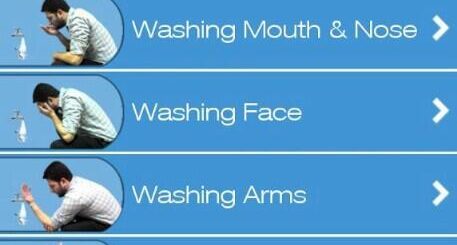The Major Ritual Impurity and the Full Ablution Ghusl
The Major Ritual Impurity and the Full Ablution (Ghusl /Ritual Bath):
Things which Require a Person to Perform Full Ablution:
There are certain things which require an adult Muslim to perform full ablution (ghusl) before engaging in the prayer or circumambulating the Ka‛bah. Before he performs such ablution, he is said to be in a state of a major ritual impurity.
These things are as follows:
- Ejaculation with pleasure and by any means, while asleep or awake.
Ejaculation involves the expulsion of seminal fluid, a thick whitish fluid, from the urethra of the penis during orgasm, which is generally followed by a feeling of lethargy and inertia - Sexual intercourse: This involves penetration even if it does not lead to ejaculation. In fact, mere penetration of the glans into the vagina provides sufficient grounds for performing ghusl, i.e.taking a ritual bath. The Qur’an says, “If you are in a state of major impurity, then purify yourselves.”(Soorat Al-Maa’idah, 5:6)
- Menstrual blood and post-natal bleeding
•Menstrual blood is a natural type of blood, which flows from the uterus of women and occurs at roughly monthly intervals during a woman’s reproductive years. It usually lasts more or less seven days with some variation from one woman to another.
•Post-natal bleeding: This bleeding takes place following a delivery in the post-natal period and lasts for a number of days.
Menstruating women and women experiencing their post-natal bleeding are exempt from fasting as well as from performing the prayers. They must, however, make up for their missed fasts but not for the missed prayers. During this period, a husband and wife can satisfy their sexual desire but without having an intercourse. At the end of menstruation and post-natal bleeding, women must take a ritual bath (ghusl).
As the Qur’an states, “They will ask you about menstruation. Say, ‘It is an impurity, so keep apart from women during menstruation and do not approach them until they have purified themselves. But once they have purified themselves, then go to them in the way that Allah has enjoined on you.’” (Soorat Al-Baqarah, 2:222)
How to Remove the Major Ritual Impurity (Janaabah)?
To perform the full ablution, It would be sufficient for a Muslim to wash the entire body with water with the intention that it is for the purpose of purity and worship.
- However, the best method of taking a ritual bath is to wash oneself in the same way one cleans oneself after answering nature’s call, perform wudoo’ and then wash the entire body with water. Doing so increases one’s rewards, as it is in accordance with the guidance of the Prophet .
- After taking a ritual bath that way, there is no need to perform wudoo’along with it. However, the best method of removing the major ritual impurity is to perform the full ablution which includes wudoo’, for this was the very practice of the Prophet .
Wiping over the Socks
Islam is so practical that it allows a Muslimto wipe over the top of his socks or shoes with wet hands (but not over the soles) instead of washing his feet when renewing his wudoo’ on condition that he has put them on after having performed wudoo’. He can continue doing so for a period not exceeding 24 hours for a resident and 72 hours for a traveller.
The feet must, however, be washed when performing a ritual bath to remove janaabah.

What to Do in Case One Is Unable to Use Water
If a Muslim is unable to use water to perform wudoo’ or take a ritual bath (ghusl) due to illness, when water is not readily available or when using the available water for wudoo’ or ghusl would leave insufficient water for drinking, he can resort to pure earth as a substitute for ablution. This is called tayammum, and he can continue to do so until he finds sufficient water or becomes able to use it.
Manner of Performing Tayammum: (1) Strike both hands slightly on pure earth once, (2) wipe the face with them, (3) wipe the back of the right hand with the palm of the left, and then the back of the left hand with the palm of the right hand
Number of View :1293

















